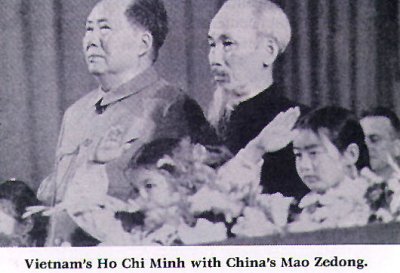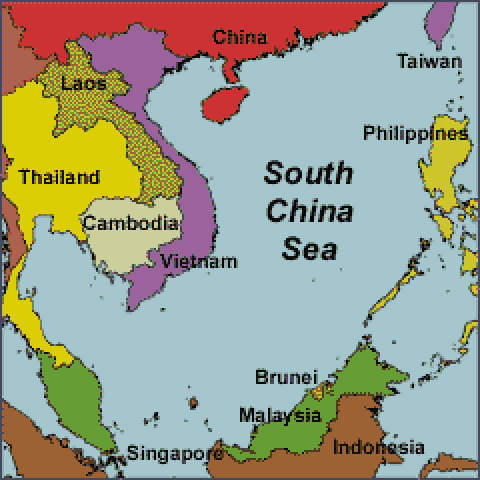The World Association for Political Economy (WAPE) is a relatively-new Shanghai-based organization organized by members of the Chinese Academy of Social Sciences. Members are Marxist economists in CASS and around the world and is an effort to reach out to left-leaning political economists around the world.
Consequently, when the ninth international congress of WAPE in May 2014 was announced to be held in Hanoi, hosted by the Vietnam Academy of Social Sciences, I decided to attend, along with members from 21 other countries. Given the problems between the two countries, a China/Vietnam conference collaboration suggested the possibility of socialist communication and working together. Little did I imagine that I would be in Hanoi during the biggest Vietnam/China crisis in decades, the Chinese oil rig in the East/South China Sea.
On May 2, the Chinese deployed a new oil rig in the sea accompanied by numerous escort vessels. The Vietnamese government quickly and strongly objected that the rig was in Vietnamese territorial waters and demanded that it be removed. Over the next several days, Chinese and Vietnamese vessels confronted one another, with incidents of ramming and use of water cannon, and politicians exchanged angry words. Meanwhile, the US government was surely gleeful to see the countries quarreling and plotting to use the differences to draw Vietnam into the "Pivot" strategy.
The confrontation continued into June; Vietnam sent a protest note to the United Nations calling for enforcement of international law. China's response is that the rig is clearly in Chinese territorial waters. Vietnam continues to appeal to other countries, especially ASEAN, for support. China plans to withdraw the rig this summer as monsoon season approaches; the best way in my view is for the Chinese to reduce tension by withdrawing the rig as soon as possible.
Early in May, anti-Chinese protests in Vietnam turned into destructive riots, with hundreds of factories damaged and 2-4 Chinese workers beaten to death. Thousands of Chinese fled Vietnam. The Vietnamese government moved to stop the attacks, arresting hundreds. Many of the factories damaged were owned by Taiwan, South Korea, and Singapore leading one to wonder whether there was an element of anger at the export factory system and neoliberalism as well as anti-Chinese feeling.
Day after day when I was in Hanoi May 20-25, the dispute was front page headlines in the Vietnamese English newspaper and television. I had several in-depth conversations (in English) on the situation with Vietnamese I knew from my previous two study tours: the Vietnam Women's Union, Vietnam-USA society, Vietnam Association for Victims of Agent Orange, the Communist Party of Vietnam. Even in my hotel, the service person hailing my cab initiated a conversation on the subject. The Women's Union began dispatching people to rural areas to explain to women at the grassroots the crisis and what they could do to help.
My contacts in Vietnam were eager to talk to me, and all of them expressed great concern and anger over the Chinese action. This felt like the first step of a potential national mobilization, everyone was rallying to support the country. I sensed the national unity and organization that defeated the US in the Vietnam/American War.
I sought to understand. History over the last 2000 years tells of repeated Chinese invasions of Vietnam; the last border war fought in 1978. The huge disparity in size and power means that a border war for China could be a war of national emergency for Vietnam. There was an element of feeling, psychology, between the two countries that I could not grasp.
The East/South China Sea is rich in energy resources; a possible solution to the conflicting claims is joint development for mutual benefit. Increasing US military pressure is creating greater tension and urgency as the US pivot strategy is to control these shipping lanes which are used for a good portion of global trade. China's unilateral action is perceived as aggressive, Vietnam is concerned that China is unfolding a plan to control these seas. China's action could be counterproductive by providing a reason for greater US presence. Chinese withdrawal would reduce tensions and create space for dialogue.
On the technical boundary issues, reading through Vietnamese, Chinese and Western arguments and presentations, the conflicting claims of the different countries all seemed to have valid points from their own perspective. The historically rooted claims deserve in-depth study and I didn't feel comfortable having a strong opinion without doing a lot more work. But it seems to me that China, as a big socialist country, should go out of its way to consider, discuss and respect the views of a smaller socialist comrade.
China's purpose
What was China trying to do? The timing seemed clear: Pres. Obama toured the region in late April, during which he made substantially expanded US military commitments: supporting the revision of the Japanese peace constitution and the rise of Japanese militarism, reinforcing a hostile approach to North Korea including the adoption of a military doctrine including pre-emptive strikes on the North, signing a 10-year deal with the Philippines to reintroduce major US military forces into Philippine bases. Certainly US anti-imperialists must oppose the expansion of US military power in the Asia/Pacific region
China's oil rig may have been intended in part as an effective counter move -- placed in the strategically critical East/South China Sea where a substantial volume of the world's shipping passes through. This showed the world that with all its saber rattling, the US would do nothing. China might also feel urgency to unfold a plan to create "facts on the ground" in the sea -- US military forces are gathering to back Philippine claims to the same area.
Thus a Chinese move to counter expanding US military presence, clearly aimed at encircling and containing China. But should such a move be made overriding Vietnamese concerns?
No Vietnam/US military alliance
Some have alleged a Vietnam/Us military alliance has formed, implicit if not explicit. I raised the issue and my Vietnamese friends and comrades could not have been more emphatic that this in not true. Vietnam pursues an independent foreign policy and will not ally with a second country to oppose a third. Indeed the US navy's port calls in Da Nang don't have much military significance.
However, when I said that it is the job of anti-imperialists in the US is to oppose US military expansion, such as Obama's new ties with Japan and the Philippines, there was neither support nor disagreement with that view.

I concluded that Vietnam indeed has an independent foreign policy, but finds itself in a tricky and difficult tactical situation as the world' two most powerful countries vie for position in the region. Vietnam, as one friend put it, is walking a tightrope. The country does not want to become a pawn in a big power global strategy game.
Trans Pacific Partnership
I raised the TPP, citing that US experience with NAFTA has been a disaster for the working class of both Mexico and the US, succeeding mainly in making the 1% richer. The response was that Vietnam needs markets, and would only make trade arrangements that facilitate its economic development and do not impinge on its national identity. I reflected that again, as a smaller country, Vietnam may be concerned it can be shut out of the action.
The WAPE Conference (May 24-25)
Meanwhile, the WAPE conference theme was, "Growth, Development and Social Justice." The conference issued a consensus statement citing the importance of economic growth that is fair and people-oriented and which gives due attention to preservation of the environment. The positive role of the state was affirmed and neoliberal solutions opposed. Both Vietnamese and Chinese comrades worked together productively and were in agreement on this statement. I hoped that in the disputes over the oil rig and maritime boundaries, more socialist dialogue could help on the basis of the need for unity of the international working class.
China needs to recognize that as the big power, with a long history of aggression against Vietnam, it must take the initiative to treat its neighbor with special consideration and respect. US imperialist strategy is to divide Vietnam and China, and to use Vietnam against China. The Chinese should withdraw their oil rig, consult with Vietnam, and work out a better response to US aggression. This will be the best way for the two countries and the international movement in the long run.
[Duncan McFarland is a members of the Committees of Correspondence for Democracy and Socialism (CCDS) National Coordinating Committee, and coordinates the CCDS Peace & Solidarity Committee. He works with the Center for Marxist Education in Cambridge, MA]


Spread the word